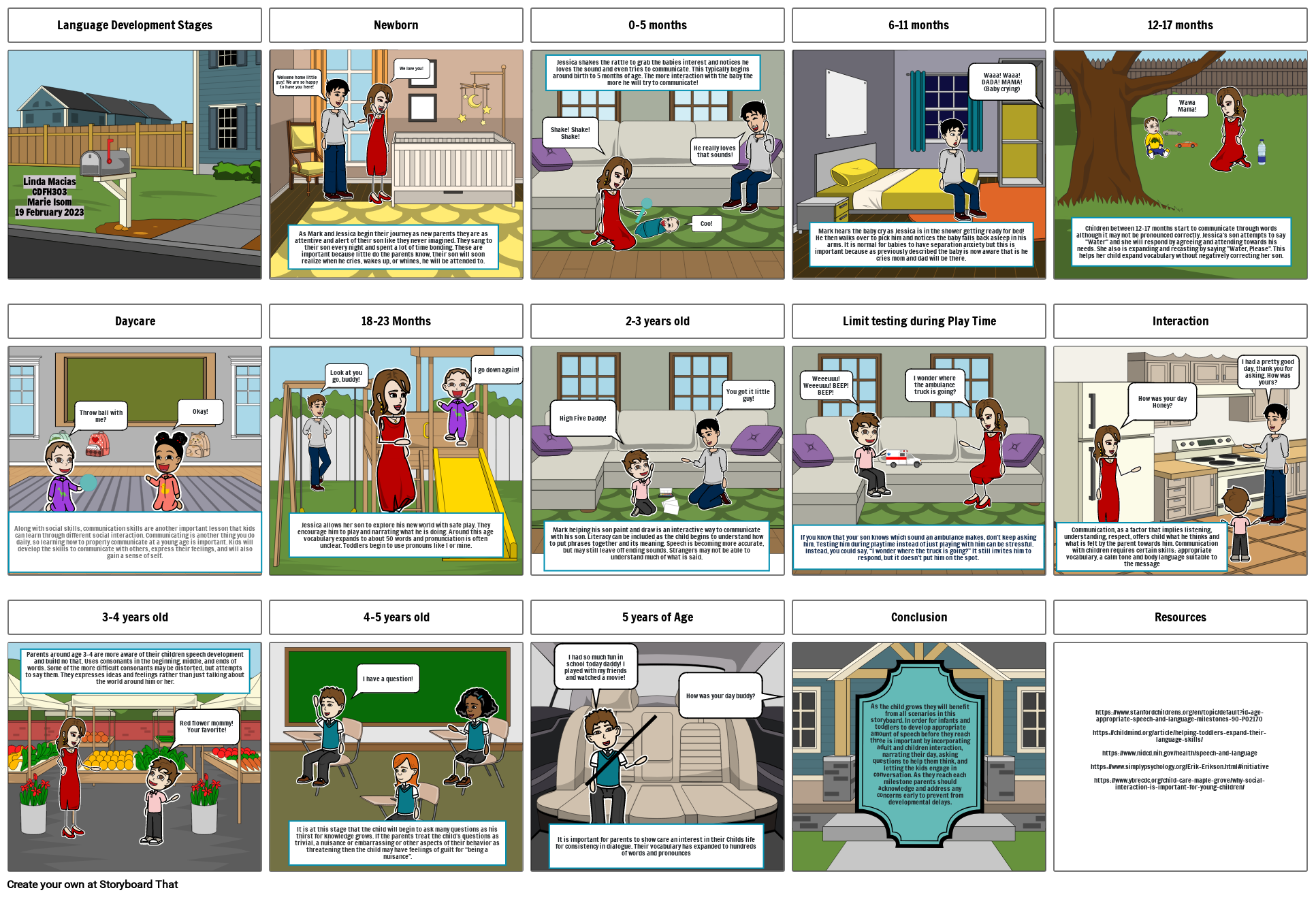Language Development

Storyboard Text
- Linda MaciasCDFH303Marie Isom19 February 2023
- Language Development Stages
- Newborn
- Welcome home little guy! We are so happy to have you here!
- As Mark and Jessica begin their journey as new parents they are as attentive and alert of their son like they never imagined. They sang to their son every night and spent a lot of time bonding. These are important because little do the parents know, their son will soon realize when he cries, wakes up, or whines, he will be attended to.
- We love you!
- 0-5 months
- Shake! Shake! Shake!
- Jessica shakes the rattle to grab the babies interest and notices he loves the sound and even tries to communicate. This typically begins around birth to 5 months of age. The more interaction with the baby the more he will try to communicate!
- Coo!
- He really loves that sounds!
- 6-11 months
- Mark hears the baby cry as Jessica is in the shower getting ready for bed! He then walks over to pick him and notices the baby falls back asleep in his arms. It is normal for babies to have separation anxiety but this is important because as previously described the baby is now aware that is he cries mom and dad will be there.
- Waaa! Waaa!DADA! MAMA! (Baby crying)
- 12-17 months
- Children between 12-17 months start to communicate through words although it may not be pronounced correctly. Jessica's son attempts to say "Water" and she will respond by agreeing and attending towards his needs. She also is expanding and recasting by saying "Water, Please". This helps her child expand vocabulary without negatively correcting her son.
- Wawa Mama!
- Daycare
- Throw ball with me?
- Okay!
- 18-23 Months
- Look at you go, buddy!
- I go down again!
- 2-3 years old
- High Five Daddy!
- You got it little guy!
- Limit testing during Play Time
- Weeeuuu! Weeeuuu! BEEP! BEEP!
- I wonder where the ambulance truck is going?
- Interaction
- How was your day Honey?
- I had a pretty good day, thank you for asking. How was yours?
- Along with social skills, communication skills are another important lesson that kids can learn through different social interaction. Communicating is another thing you do daily, so learning how to properly communicate at a young age is important. Kids will develop the skills to communicate with others, express their feelings, and will also gain a sense of self.
- 3-4 years old
- Parents around age 3-4 are more aware of their children speech development and build no that. Uses consonants in the beginning, middle, and ends of words. Some of the more difficult consonants may be distorted, but attempts to say them. They expresses ideas and feelings rather than just talking about the world around him or her.
- Red flower mommy! Your favorite!
- 4-5 years old
- Jessica allows her son to explore his new world with safe play. They encourage him to play and narrating what he is doing. Around this age vocabulary expands to about 50 words and pronunciation is often unclear. Toddlers begin to use pronouns like I or mine.
- I have a question!
- 5 years of Age
- Mark helping his son paint and draw is an interactive way to communicate with his son. Literacy can be included as the child begins to understand how to put phrases together and its meaning. Speech is becoming more accurate, but may still leave off ending sounds. Strangers may not be able to understand much of what is said.
- I had so much fun in school today daddy! I played with my friends and watched a movie!
- How was your day buddy?
- Conclusion
- If you know that your son knows which sound an ambulance makes, don’t keep asking him. Testing him during playtime instead of just playing with him can be stressful. Instead, you could say, “I wonder where the truck is going?” It still invites him to respond, but it doesn’t put him on the spot.
- As the child grows they will benefit from all scenarios in this storyboard. In order for infants and toddlers to develop appropriate amount of speech before they reach three is important by incorporating adult and children interaction, narrating their day, asking questions to help them think, and letting the kids engage in conversation. As they reach each milestone parents should acknowledge and address any concerns early to prevent from developmental delays.
- Resources
- Communication, as a factor that implies listening, understanding, respect, offers child what he thinks and what is felt by the parent towards him. Communication with children requires certain skills: appropriate vocabulary, a calm tone and body language suitable to the message
- https://www.stanfordchildrens.org/en/topic/default?id=age-appropriate-speech-and-language-milestones-90-P02170https://childmind.org/article/helping-toddlers-expand-their-language-skills/https://www.nidcd.nih.gov/health/speech-and-languagehttps://www.simplypsychology.org/Erik-Erikson.html#initiativehttps://www.ybrecdc.org/child-care-maple-grove/why-social-interaction-is-important-for-young-children/
- It is at this stage that the child will begin to ask many questions as his thirst for knowledge grows. If the parents treat the child’s questions as trivial, a nuisance or embarrassing or other aspects of their behavior as threatening then the child may have feelings of guilt for “being a nuisance”.
- It is important for parents to show care an interest in their Childs life for consistency in dialogue. Their vocabulary has expanded to hundreds of words and pronounces
Over 30 Million Storyboards Created

